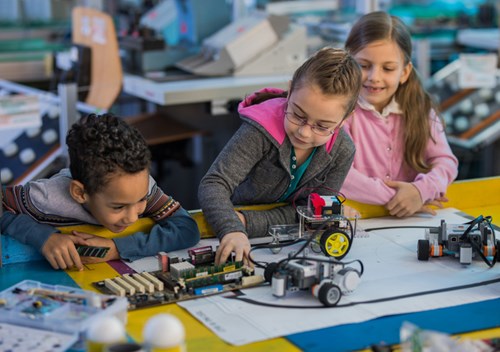Why kids need to code
There is no shortage of articles, blogs or podcasts to open our eyes to the fact that technology consumption among children & teens has risen significantly in the last decade. We are wading in uncharted territory as past generations have never had this kind of constant technological immersion. Covid and online schooling only added fuel to the already raging fire.
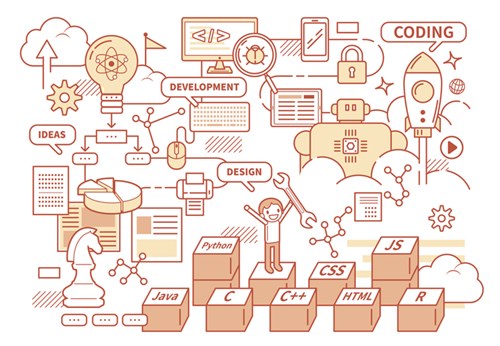
The evidence points overwhelmingly to the fact that the future of global innovation lies in the hands of our precious off-spring. But what can we do when schools cannot keep up with the latest tech development and are still largely relying on outdated ICT curricula, while our kids are preoccupied with digital content consumption in the form of YouTube, Roblox or TikTok?
We plan our kids’ future by selecting the right school and saving for college but we remain ignorant with regards to their future when it comes to technology. For the most part, we leave that responsibility to the schools or technology itself. Hoping that somehow it will all work out in the end. Blindly unaware of the impact technology will have on our children’s future. If we want our kids to have any input in directing future technological developments, we need them to better understand how this technology works.
We do not question the necessity of algebra and geometry in school, because this is deemed fundamental knowledge - but how many adults need to solve quadratic equations or find the area of a cone on a regular basis beyond high-school? Not many, right? Yet, it remains part of every school curriculum worldwide, and rightly so - these are important building blocks for much bigger topics, like engineering or architecture.
As we embrace technology, we also need to embrace the fundamentals on which it is built, it’s building blocks! In the current digital environment, it is equally as important for our kids to learn the basics of programming, as it is to learn algebra and grammar.
Programming helps children
-
develop critical problem-solving skills
-
learn valuable algorithmic thinking skills
-
encourages creativity and
-
promotes resilience
To top that off, there is a huge global shortage of skilled programmers and engineers. Tens of thousands of jobs go unfilled every year. The world needs us to step-up and prepare our kids for inevitably tech-heavy careers.
So what can we do as parents? Coding for kids demystified.
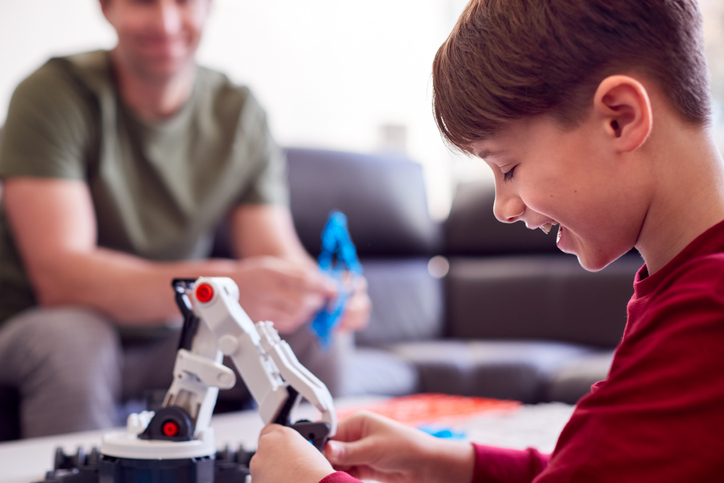
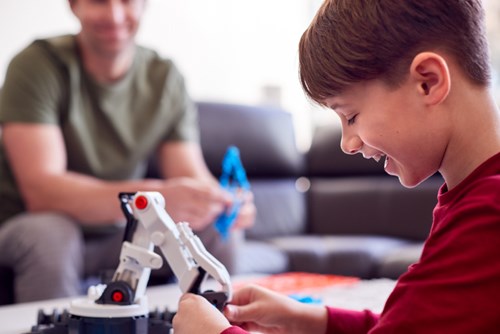
Check with your school.
Many private (and some public) schools work with external EdTech providers or may have dedicated ICT teachers offering extracurricular coding clubs, discovery workshops and STEM themed camps for their students.
There are usually introductory level classes available for different age groups. Some schools even offer more advanced programmes where students can participate in hackathons, olympiads and other types of programming of engineering tournaments.
- Pros: Easy and convenient way to get your child to discover a new topic in a familiar environment with their friends.
- Cons: Coding clubs are usually offered once per week and may not work with your kid’s other extracurricular activities. In this case don’t hesitate to check with other schools of familienzentrums in your area as their clubs may be open to the public. Usually subject to additional fees.
Google it!
Assuming your child’s school is not already offering some sort of extra curricular STEM program, a quick Google search for ‘coding for kids’ or ‘kinder programmieren’ will direct you to several educational establishments in your region who offer a range of workshops, classes and camps.
- Pros: Different options for various age groups and interest levels. More flexibility with scheduling.
- Cons: The unknown of what to expect and which provider to choose and usually requires at least one semester commitment. We will cover ‘how to choose a STEM camp’ in the next blog.
DIY - Do It Yourself!
There are many online tools and apps dedicated to learning coding for kids. You can get a good overview from this blogpost written by TechSpark Academy to help parents at the wake of covid-19 lockdown.
Roblox & Minecraft
Many popular games such as Roblox and Minecraft have launched free educational sub-products to redeem themselves after much concern about addictive gaming, by educators, parents and politicians. They offer some educational tools which allow children to learn some basic programming skills within their favourite game environment.
- Pros: Easier to get your child to try programming. Children are less likely to protest against a programming lesson if they know it’s based on their favourite game.
- Cons: Parents need to be very aware of the fact that some educational tools are developed by gaming companies. Their primary goal was and still is - engagement and monetization! Keeping your child playing their game is their main objective.
When is a good age to start? And the typical learning progression.
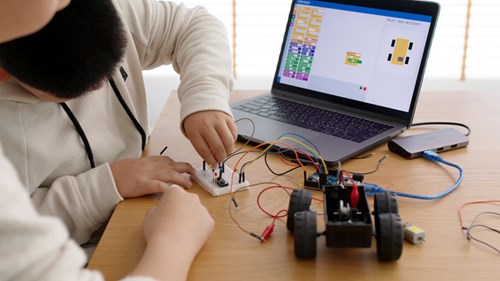
Although there are tools out there for kids as young as 3-4 years old, they may not put your child at a significant advantage over their peers. If you want to see definitive progress and results, it's best that children know how to read comfortably alone before they start any sort of coding classes. We'd say 6-7 is a reasonable starting point.
Programs for kids between 6-10 years old
Scratch
Developed by MIT, Scratch is an open-source, free education tool, ideal for children to take their first steps in the world of programming.
Scratch is an introductory block-based programming language.
With Scratch, children use graphical programming blocks to make their characters move, jump, dance, etc. Using Scratch, children learn programming fundamentals and also how to design their own projects and solve problems. There are a number of tools and platforms that offer Scratch, but bear in mind they usually come with strings attached, e.g. monthly subscriptions etc.
Roblox
Roblox and Minecraft do have educational resources, but be mindful that these were not build as an educational tool and are likely to have an alternative agenda, i.e. to keep your child playing more.
Lego Robotics
Lego robotics is hugely appealing to 7-10 year olds, as it offers them the chance to build and program their own robot. Even if a child has no interest in programming, the possibility of building their own robot awakens their imagination and curiosity, making it an unbeatable gateway to the world of engineering, computers and coding.
Programs for kids 11+ years old
From the age of 11, programming languages such as Python and Javascript are good options to encourage kids' interest in programming.
Python
Python is a high-level programming language, which means that real words are used to program, not a series of alphanumeric codes. As a result, Python is gaining popularity as a way to introduce children to the world of programming. Despite its relative simplicity, Python is a very powerful language and is one of the most widely used today.
JavaScript
JavaScript is the most widely used programming language today, due to its power and versatility, as well as its multiple applications on the web. Despite having a more complicated syntax than Python, young children can learn its fundamentals and start developing small projects and simple applications.
There are many resources available on the web designed to introduce children to the world of programming with both Python and Javascript.
Other options for these ages include
- participating in Lego Robotics programs and competitions
- learning to create mobile apps using Swift, and
- designing their own websites for more creative and design-oriented children
Programs for kids 14 years old
C++
From the age of 14, children with some programming experience can go deeper into learning one of the languages listed above, as well as more complex languages such as C++. Learning several programming languages can help students in dealing with more complex coding problems and challenges, as well as how to plan and create multi-faceted projects in an optimal way.
There are a number of online platforms, such as Udemy or Codeacademy offering online courses ideal for teenagers.
In addition, participating in programming olympiads and competitions is a good idea to motivate children who already demonstrate an interest in technology, and foster interest in advanced programming. Lucky for us parents, the EdTech scene in Switzerland is quite vibrant offering a variety of options from holiday camps to weekly coding clubs to STEM themed parties.
About the Authors
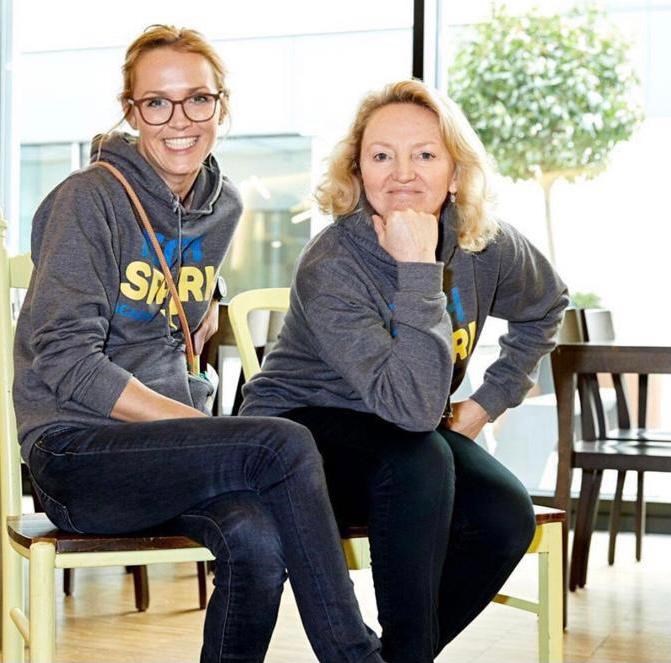
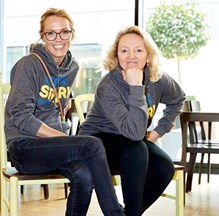
Marta Gehring & Kate Mckee are leaders of the Techspark Academy since 2015, and continue to pioneer in digital education for children in Switzerland. They were the ‘first kid on the block’ to offer coding camps for children and teens, and continue to pursue to growth of technological education by launching their own digital learning platform and preparing for an international expansion in early 2023.
Trusted for their professionalism and dedication by Google, Siemens, ETHZ and its growing portfolio of partner schools – Marta & Kate have participated and won in the 2020 Innovation & Excellence Award for their impeccably seamless transition to virtual classrooms in the wake of the covid-19 lockdown without missing a single day of their scheduled classes at multiple partner schools across Switzerland.
Heads up: Classes and camps are limited to 6 kids per course and Zurich City Camps in particular get booked out very quickly!
Book early with MOMIZEN10 for a 10% discount for Zurich City Camps in July 18 - 22nd and August 15 - 19th.
Related Articles
Why are summer camps good for our children
8 Effective Tips for Raising Teens
Tips to help children eat more vegetables
Teaching Responsibility
The top list with the greatest birthday party ideas for kids and teens
How to keep children safe online
Financial Education for Children
Tips for Getting Outside with Older Children
FREE Educational Activities for Kids in Zurich
Why are bedtime stories good for our children
Tips for an Overnight Stay in Mountain Huts in Switzerland
10 Tips for Organising a Hassle-Free Birthday Party for Kids
Is Art Camp Good for Kids? The answer is Yes!
3 Things that an active 6-year old enjoys doing after school
Perfect Farms around Zurich for Birthday Party
The Best Trampoline Parks Around Zurich
8 Tips for Great Family Photos with a Smartphone
6 Insider Tips for a Day in Bern with Kids
Tips on self-development while parenting
Ski and Snowboard Safety Gear for Kids
10 reasons to learn a foreign language!
7 Tips on how to be a parent and a life-long learner at the same time
Staying Healthy this Winter
Choosing the right hiking boots
10 Reasons to Go Hiking with Your Kids
Camping with Kids
Sign up here to hear more from us!
Read more from our list of topics about how to have fun with kids

